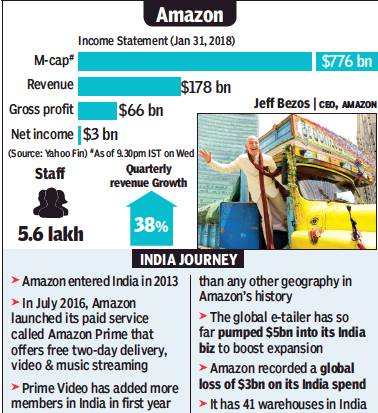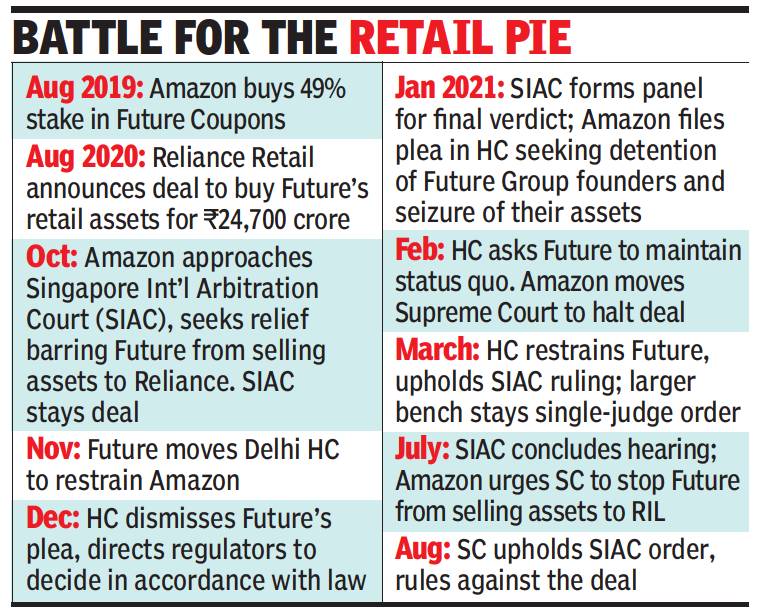Amazon in India
This is a collection of articles archived for the excellence of their content. |
Contents |
Alexa
Amitabh Bachchan’s voice
Shilpa Phadnis & Sujit John, August 20, 2021: The Times of India
Bringing Amitabh Bachchan’s voice to Alexa involved two huge technological challenges for Amazon. The voice had to sound exactly like Bachchan’s, since it’s a voice that Indians recognise only too well. As Manoj Sindhwani, vice-president of Alexa Speech at Amazon, says, “My mom’s a big fan of Mr Bachchan. I was worried that if there was even a single flaw, I would not hear the end of it.”
This was further complicated, Sindhwani says, by the manner in which Bachchan speaks — it’s extremely rich, and he speaks with a lot of emotion, intonation. That’s hard for text-to-speech voice systems to perfect. The second big challenge was to use ‘Amit ji’ as the wake word. Wake word is the word you use to activate Alexa.
We’ll know how well Amazon solved these issues only when people start using ‘Amit ji’ on a large scale. Inside Amazon, they are delighted with what they have accomplished. Bachchan is only the fourth celebrity, and the first outside the US, to be part of the Alexa voice feature. The first celebrity voice used was that of American actor Samuel L Jackson, which was launched in December 2019.
The work with Bachchan involved tech teams in India, Poland, the UK and the US, and the actor recording his voice across many sessions, so that the artificial intelligence (AI) systems could then work on it.
Puneesh Kumar, country leader for Alexa in Amazon India, says — to the amusement of all at the company — a sound engineer in Poland is on a first-name basis with Bachchan, given all the interactions they had.
Status in India
As in 2018

From: May 10, 2018: The Times of India
See graphic :
Status of Amazon in India, as in 2018
Future-Reliance vs. Amazon
The issues, as in 2021
Bloomberg, February 9, 2021: The Times of India
Why Amazon is feuding with a partner and billionaire Mukesh Ambani
A legal spat between Amazon.com Inc. and its Indian partner that started with an arbitration verdict in Singapore has got fiercer in New Delhi courtrooms. And neither side is ready to back off.
The US e-commerce giant and Mumbai-based Future Group, whose retail assets billionaire Mukesh Ambani’s Reliance Industries Ltd. agreed to buy for $3.4 billion in August, are locked in a dispute over that deal. Amazon says Future violated a partnership contract with the asset sale to its rival and wants to scuttle it, while the indebted Indian group says it would collapse if the transaction fails. The Jeff Bezos-led e-tailer accuses Future and its founder Kishore Biyani of flouting an interim order in October from a Singapore arbitration court that halted the asset sale. Amazon also recently asked an Indian court to jail Biyani and has petitioned local regulators not to approve the Future-Reliance deal while the arbitration is underway.
Amazon gained an early legal advantage in Singapore but Future scored in an Indian court this week that allowed the deal to proceed. With Amazon likely to take the fight next to India’s apex court, the legal wrangle continues to threaten India’s biggest retail acquisition.
But why is the world’s largest e-commerce company seeking to derail a deal that’s essentially bailing out a beleaguered retailer, whose market valuation is less than 1% of its own? Here’s what we know so far:
1. What led to the feud?
Amazon, in early October, accused its partner Future Group of breaching terms of a mutual agreement by announcing an asset sale deal with Reliance, the conglomerate helmed by Asia’s richest man.
Amazon had bought 49% in one of Future’s unlisted firms last year, with the right to buy into the listed flagship Future Retail Ltd. after a few years. But the retailer ran into a severe cash crunch when India went into a lockdown in March to curb the coronavirus outbreak.
In May, Amazon was considering increasing its stake in Future Retail, people familiar with the matter said at the time. But no such transaction materialized quickly and Future cut a deal with Reliance, infuriating Amazon. The US firm claims that its contract with the unlisted Future unit barred a transaction with a number of persons and companies, including Ambani and Reliance.
2. What’s the fight really about?
The fight is essentially for the dominance of India’s estimated $1 trillion consumer retail market. Future Group is caught in the middle of this tussle between companies helmed by two of the world’s richest men.
Reliance is already the country’s biggest brick-and-mortar retailer. Acquiring Future’s retail, wholesale, logistics and warehousing units would almost double its footprint and give it unparalleled edge over rivals -- an advantage Amazon is not willing to cede. Blocking Reliance is crucial for Amazon if it wants to hold sway over the only billion-people plus consumer market still open to foreign firms. It has pledged to invest $6.5 billion, a sign of its commitment to the Indian market.
3. What did the courts in India and Singapore say?
After accusing Future of breaching its contract, Amazon secured emergency relief from an arbitration court in Singapore in October that temporarily restrained Future Group from going ahead with the asset sale. ?Future and Reliance have said that the Singapore court’s interim ruling is not binding.
Soon after the arbitration court’s order, Reliance had said it intends to buy Future’s assets “without any delay.” Future Group said back then that the matter “will have to be tested” under Indian laws.
Amazon sought enforcement of the arbitration order in India and asked a local court in January to detain Biyani as well as seize Future Group’s assets if it doesn’t comply. A judge at the Delhi High Court earlier this month agreed with Amazon and halted the asset sale.
Future Retail appealed the order before a two-judge panel, which within days overturned the ruling saying that the agreement between Amazon and another Future Group firm cannot be enforced as Future Retail was not a party to that pact. The US e-commerce firm can -- and most likely will -- appeal the adverse ruling in India’s Supreme Court.
The setback for Amazon comes weeks after it wrote letters to local regulators requesting them to stop approvals for the deal. The local antitrust regulator gave its approval in November. The stock exchanges said in January that they had no adverse observations. Future Group is now awaiting a company court’s nod on the deal.
4. What are the arguments by the two sides?
During courtroom arguments, Future’s lawyers have said that Future Retail -- the entity selling the assets -- was not part of the contract between Amazon and the unlisted group firm in which the U.S. e-tailer acquired a stake. Amazon’s counsel argued that both the Future firms were controlled by the same owners.
Future Group’s lawyers have also argued that its existence hinges on the sale to Reliance, and an aborted deal would result in the loss of tens of thousands of jobs. They say the Indian retailer is being driven to bankruptcy by a global giant.
Amazon has hinted that this spat is about India’s willingness to enforce business contracts. If Future is allowed to renege on a contract, it’ll mean business contracts are not sacrosanct and investments in India are risky -- an inconvenient image as the nation looks to lure foreign investment.
5. Who is representing the parties?
A battery of India’s highly-paid top legal brains are arguing for the two sides, showing the high stakes involved in the case. More than 50 lawyers have represented the companies, Biyani and his family in the Indian court during the hearing -- some of them video conferencing from their London homes or farm houses on the outskirts of New Delhi.
Some of the legal hot shots include India’s former Attorney General Mukul Rohatgi, two former solicitor generals Harish Salve and Gopal Subramanium as well as former additional solicitor general and politician, Abhishek Manu Singhvi.
6. Who’s hanging by the thread awaiting a verdict?
Future Retail and the group at large, since their survival depends on it. The group defaulted on obligations in August 2020 and missed an interest payment on its dollar bond this January. Future Retail has posted losses for four straight quarters and its shares have plunged 76% in the past year.
The firm has refused to explore an out-of-court settlement with Amazon as it has already sought regulatory approvals for the deal with Reliance.
The Indian retailer will go bankrupt if the deal fails, Salve has argued in court in the past. Amazon doesn’t want Reliance to acquire Future’s assets even if it means its actions “sink the ship,” he said. Amazon has denied that saying it intends to save the Indian retailer.
SC upholds Singapore ruling against Reliance-Future
AmitAnand Choudhary, August 7, 2021: The Times of India

From: AmitAnand Choudhary, August 7, 2021: The Times of India
In a setback to the proposed Rs 24,713-crore Future-Reliance deal, the Supreme Court on Friday held that Singapore’s Emergency Arbitrator (EA) award restraining Future Retail Ltd (FRL) from going ahead with its merger with Reliance Retail is valid and enforceable and allowed the plea of US ecommerce giant Amazon, which had challenged the Ambani-Biyani pact.
A bench of Justices R F Nariman and B R Gavai quashed the order passed by a division bench of the Delhi high court, which virtually allowed Kishore Biyani’s Future group to go ahead with the deal by staying the single bench order that had directed the group to maintain status quo in view of Singapore’s EA award.
HC order was not appealable, rules SC
The SC bench also ruled that the order passed by the single bench of the HC for the enforcement of the Singapore arbitration award was not appealable and could not have been challenged.
The bench framed two questions arising out of the corporate battle for adjudication--first whether an award of Emergency Arbitrator under the Arbitration Rules of the Singapore International Arbitration Centre can be deemed to be an order under the Arbitration Act, and second, whether an order passed for enforcement of the award by a single judge of the HC can be appealed. The SC passed verdict in favour of Amazon on both counts.
“We answer the first question by declaring that full party autonomy is given by the Arbitration Act to have a dispute decided in accordance with institutional rules which can include Emergency Arbitrators delivering interim orders, described as ‘awards’. Such orders are an important step in aid of decongesting the civil courts and affording expeditious interim relief to the parties,” the bench said.